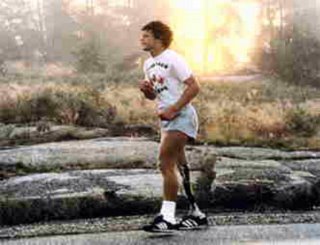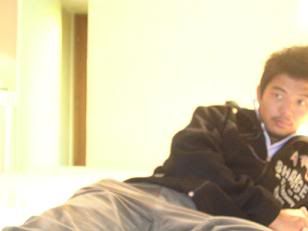“I’m gonna do my very best. I’ll fight. I promise I won’t give up.” - Terry Fox
-----------------------------------------------------
 Terry Fox was born in Winnipeg, Manitoba, and raised in Port Coquitlam, British Columbia, a community near Vancouver on Canada's west coast. An active teenager involved in many sports, Terry was only 18 years old when he was diagnosed with osteogenic sarcoma (bone cancer) and forced to have his right leg amputated 15 centimetres (six inches) above the knee in 1977.
Terry Fox was born in Winnipeg, Manitoba, and raised in Port Coquitlam, British Columbia, a community near Vancouver on Canada's west coast. An active teenager involved in many sports, Terry was only 18 years old when he was diagnosed with osteogenic sarcoma (bone cancer) and forced to have his right leg amputated 15 centimetres (six inches) above the knee in 1977. While in hospital, Terry was so overcome by the suffering of other cancer patients, many of them young children, that he decided to run across Canada to raise money for cancer research.
He would call his journey the Marathon of Hope.
After 18 months and running over 5,000 kilometres (3,107 miles) to prepare, Terry started his run in St. John’s, Newfoundland on April 12, 1980 with little fanfare. Although it was difficult to garner attention in the beginning, enthusiasm soon grew, and the money collected along his route began to mount. He ran 42 kilometres (26 miles) a day through Canada's Atlantic provinces, Quebec and Ontario.
It was a journey that Canadians never forgot.
However, on September 1st, after 143 days and 5,373 kilometres (3,339 miles), Terry was forced to stop running outside of Thunder Bay, Ontario because cancer had appeared in his lungs. An entire nation was stunned and saddened. Terry passed away on June 28, 1981 at age 22.
He continued to wear his Marathon of Hope T-shirt in hospital and refused the many offers, including one from the Toronto Maple Leaf hockey team, to finish his run for him.
In less than 48 hours the CTV television network arranged a special telethon and by the end had raised more than $10 million – $1 million from the provincial government of British Columbia, another $1 million from the province of Ontario and substantial cheques from corporations. Most, however, came from private donations.
Isadore Sharp had sent a telegram which Terry pinned to his hospital bed. He said that Terry's marathon was just the beginning and that a fundraising run would be held in his name every year to continue his fight against cancer.
“You started it. We will not rest until your dream to find a cure for cancer is realized.”
For the next 10 months, Terry battled the disease. Some days the pain was nightmarish; some days, he felt well enough to go out with Rick Hansen and his friends.
As he fought for his life, he was honoured with awards: He was the youngest Companion of the Order of Canada, the nation's top civilian honour; he was named Newsmaker of the Year by the Canadian Press; he won the Lou Marsh trophy for outstanding athletic achievement; his portrait was hung in the Sports Hall of Fame and letters of encouragement came from around the world; and, most importantly, donations to his Marathon of Hope reached $23.4 million. The Guinness Book of Records named him top fundraiser. A mountain was named after him in British Columbia.
Terry died, his family beside him, June 28, 1981 – one month short of his twenty-third birthday.
There was nation-wide mourning. Flags were flown at half-mast. But people didn't forget him and his story didn't end with his death.
The first Terry Fox Run was held that September – more than 300,000 people walked or ran or cycled in his memory and raised $3.5 million.
Terry's mother Betty says there would be no Terry Fox Run if not for Isadore Sharp. And Mr Sharp, who has known the loss of a son to cancer, believes one day a brilliant young researcher, perhaps one funded by a Terry Fox grant, will find a cure for the disease.
“Terry did not lose his fight,” Mr Sharp says. “Perhaps he finished all he had to do. Terry is like a meteor passing in the sky, one whose light travels beyond our view, yet still shines in the darkest night.”
The heroic Canadian was gone, but his legacy was just beginning.
October 21, 1980 – Terry Fox is awarded British Columbia's highest civilian award; The Order of the Dogwood.
November 22, 1980 – The American Cancer Society presents Terry with their highest award; The Sword of Hope.
February 1, 1981 – Terry's hope of raising $1 from every Canadian to fight cancer is realized. The national population reaches 24.1 million; the Terry Fox Marathon of Hope fund totals $24.17 million.
June 28, 1981 – After treatment with chemotherapy and interferon, Terry Fox dies at Royal Columbian Hospital, New Westminster, British Columbia – one month short of his twenty-third birthday.
July 17, 1981 – British Columbia names a 2,639-metre (8,658 foot) peak in the Rocky Mountains, Mount Terry Fox, as a lasting symbol of Terry's courage.
July 30, 1981 – A 83-kilometre (52 mile) section of the Trans-Canada Highway, between Thunder Bay and Nipigon, is renamed the Terry Fox Courage Highway in Terry’s honour.
August 29, 1981 – Terry Fox is posthumously inducted into the Canadian Sports Hall of Fame.
September 13, 1981 – The first Terry Fox Run is held at more than 760 sites in Canada and around the world. The event attracts 300,000 participants and raises $3.5 million.
April 13, 1982 – Canada Post issues a Terry Fox Stamp; prior to this, no other stamp had been issued until 10 years after the death of the honouree.
April 20, 1982 – The Marathon of Hope fund now totals $27.8 million and is allocated to cancer research projects in the Terry Fox New Initiative Programs of the National Cancer Institute of Canada.
June 26, 1982 – A 2.7-metre (9 foot) bronze statue of Terry Fox is unveiled at Terry Fox Lookout, a site just off the Terry Fox Courage Highway, west of Thunder Bay, Ontario. The site overlooks Lake Superior near where Terry ended his run on September 1, 1980.
During 1983 – The Canadian Coast Guard dedicates its second most powerful ship in Terry’s name. The ship is re-commissioned in 1994.
May 26, 1988 – The Terry Fox Run becomes a Trust, independent of the Canadian Cancer Society. The organization becomes known as The Terry Fox Foundation.
December 1990 – The Sports Network (TSN) names Terry Fox Athlete of the Decade; the field included Wayne Gretzky and Michael Jordan.
February 11, 1994 – The Terry Fox Hall of Fame is created to provide permanent recognition to Canadians who have made extraordinary personal contributions to assist or enhance the lives of people with physical disabilities.
July 1, 1998 – The Terry Fox Monument is re-dedicated in Ottawa, Ontario and is now part of the Path of Heroes; a government initiative to raise public awareness and appreciation of great Canadians that have helped shape the country.
August 28, 1998 – The Terry Fox Foundation announced a new infusion of $36 million in funds for Canadian cancer research. The new program, called The Terry Fox New Frontiers Initiative, represents a departure from any existing research programs and will target increased innovation and risk.
June 30, 1999 – Terry Fox is voted Canada's Greatest Hero in a national survey.
January 17, 2000 – Terry is once again immortalized on a Canadian postage stamp. This time he is part of the prestigious Millennium Collection of influential and distinguished Canadians.

0 Comments:
Post a Comment
<< Home